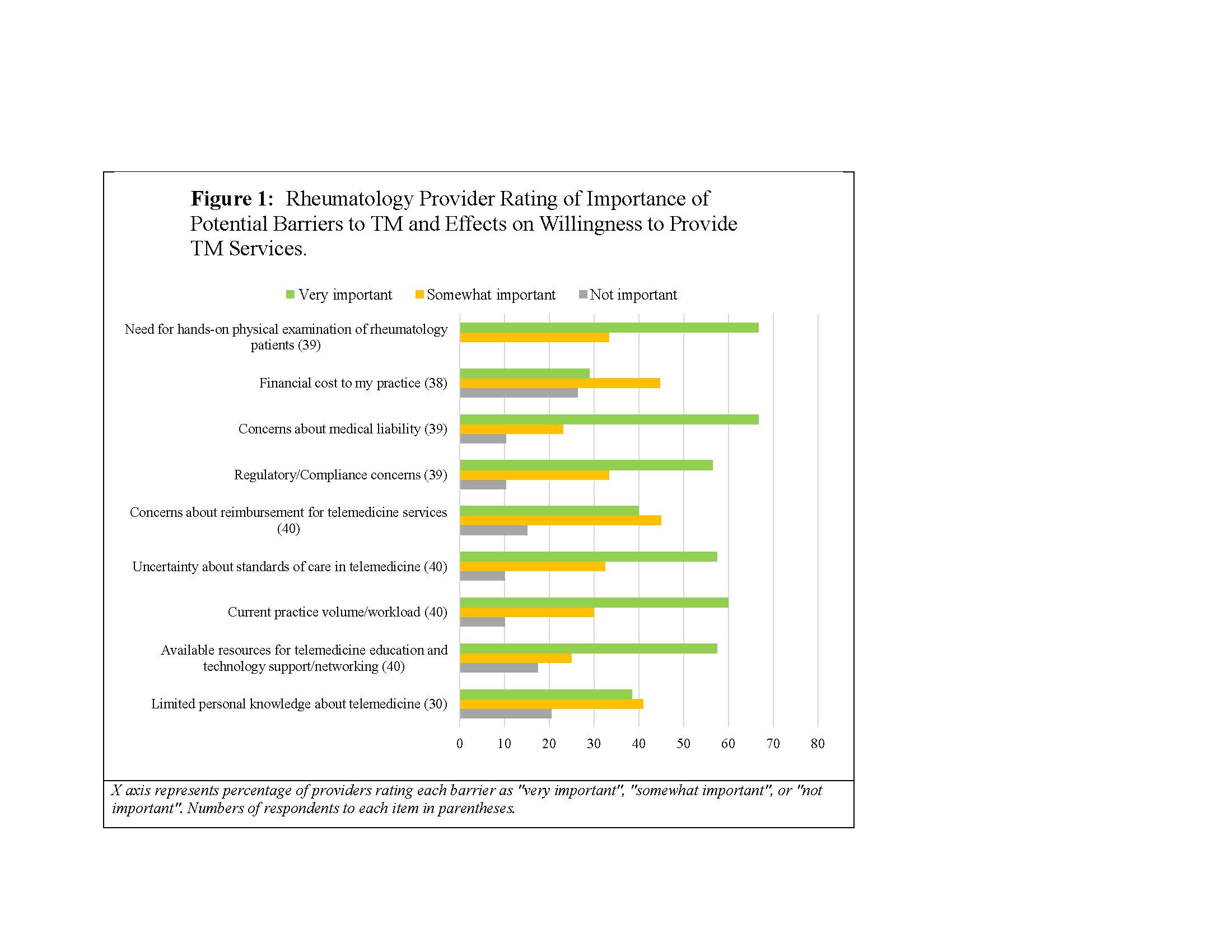Session Information
Session Type: Poster Session (Monday)
Session Time: 9:00AM-11:00AM
Background/Purpose: Telemedicine (TM) is increasingly employed in chronic disease management and can reduce barriers in access to care. In the Southwestern U.S., where there is a disproportionate shortage of rheumatologists, TM may be one tool to improve access to rheumatology care. While use of TM in rheumatology is growing, the nature of rheumatology patient evaluations presents unique challenges to this modality of care. We sought to understand the attitudes of rheumatologists in the Southwestern U.S. towards the use of TM in caring for patients with rheumatic diseases.
Methods: We surveyed a convenience sample of rheumatology providers attending the 19th Annual Rheumatic Diseases Conference in Santa Fe, NM. Respondents completed paper questionnaires in which we collected general provider information, and assessed use of and familiarity with TM, general attitudes towards TM, and perceived barriers to its use. All respondents were anonymous. Simple counts of provider responses are reported here.
Results: A total of 42 participants completed our survey: 39 were actively practicing rheumatology (31 physicians and 8 physician assistants or nurse practitioners). 32.5% of providers were part of independent small group or solo practices, 37.5% were employed by multispecialty or hospital-affiliated groups, and 25% practiced in academic centers. 22 providers practiced in NM, followed by TX (9) and CO (5), and three were from non-Southwestern states. All but two providers (neither from NM) were practicing in underserved areas. Four providers from NM and CO reported practicing TM. Of those not using TM, 60.5% had considered providing TM services, while 17% had considered implementing TM services, but ultimately decided not to. Among possible barriers to TM, current practice volume/workload, concerns about medical liability, and the need for hands-on physical exam for rheumatology patients were rated as “very important” factors in provider willingness to use TM (60%, 66.7%, and 66.7% of providers, respectively). All respondents either somewhat (64.3%) or strongly (35%) agreed that TM use by rheumatologists would help address problems with access to rheumatology care. Over half of providers also cited the following factors as very important barriers to TM use: available resources for TM education and technology support/networking (57.5%); uncertainty about standards of care in TM (57.5%); and regulatory/compliance concerns (56.4%). Most providers were either neutral toward (39%) or somewhat agreed (46.3%) with the statement that the benefits afforded to patients by offering TM would be worth the investments required to implement these services.
Conclusion: While a majority of surveyed rheumatology providers in our area have considered using TM and generally agree that it would improve access to care, few have employed it in their practices. Current provider workload, and uncertainties surrounding practice logistics and adequate patient assessment represent important barriers to TM use. Increased educational efforts in TM technology, regional support for TM infrastructure, and further study and dissemination of patient care tools and standards of care may increase rheumatologist use of TM.
To cite this abstract in AMA style:
Reiter K. Rheumatologists’ Opinions and Use of Telemedicine in the Southwestern U.S [abstract]. Arthritis Rheumatol. 2019; 71 (suppl 10). https://acrabstracts.org/abstract/rheumatologists-opinions-and-use-of-telemedicine-in-the-southwestern-u-s/. Accessed .« Back to 2019 ACR/ARP Annual Meeting
ACR Meeting Abstracts - https://acrabstracts.org/abstract/rheumatologists-opinions-and-use-of-telemedicine-in-the-southwestern-u-s/


